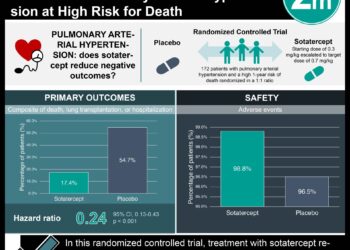Inpatient intensification of hypertension treatment in older men associated with adverse events
1. In this large, retrospective cohort study of veteran’s health administration (VHA) hospitals, males admitted to the hospital for non-cardiac reasons who had an intensification of their antihypertensive regimen before discharge had an increased risk of readmission and serious adverse events.
2. There was no difference in cardiac events or changes in systolic blood pressure after one year.
Evidence Rating Level: 2 (Good)
Study Rundown: Hypertension is one of the most prevalent chronic diseases in North America, and medications for this are frequently adjusted during inpatient admissions. This was a large, retrospective, cohort study conducted at VHA hospitals. Investigators studied patients admitted to the hospital for pneumonia, urinary tract infection, or venous thromboembolism. They found that adding a new antihypertensive medication, or increasing the dose of an existing medication by at least 20%, was associated with increased risk of readmission, medication related serious adverse events, and cardiovascular events at 30 days. A sensitivity analysis suggested this was driven largely by patients with normal outpatient blood pressure measurement prior to admission. There was no impact on mortality, systolic blood pressure at one year, or cardiovascular events at one year.
Limitations of this study included the limited range of admission diagnoses as well as the almost entirely male population. If available, recent outpatient blood pressure monitoring could help identify patients at highest risk of harm from such medication changes.
Click to read the study in JAMA Internal Medicine
Relevant Reading: Intensification of older adults’ outpatient blood pressure treatment at hospital discharge: national retrospective cohort study
In-Depth [retrospective cohort]: This was a retrospective cohort study of 4056 propensity matched older adults (age over 65) hospitalized between January 2011 and December 2013 at a VHA hospital. Over 97% of patients were male. Patients must have been admitted for either pneumonia, urinary tract infection, or venous thromboembolism. Intervention of interest was intensification of antihypertensive therapy, defined as new antihypertensive medication or dose increase of at least 20% of existing medication. Primary outcomes included 30 day readmission rates, medication related serious adverse events (SAE) within 30 days, and cardiovascular events within 1 year. Cardiovascular events were defined as emergency room visit or hospitalization for acute myocardial infarction, unstable angina, stroke, heart failure, or hypertension. Secondary outcomes included readmission rate, SAE rate, change in systolic blood pressure, and all-cause mortality at 1 year, as well as cardiovascular events and all-cause mortality at 30 days.
Patients with antihypertensive intensification had higher 30 day readmission rates (21.4% vs 17.7%, HR 1.23, 95% CI 1.07-1.42, NNH 27), and higher rates of medication related SAE within 30 days (4.5% vs 3.1%, HR 1.41, 95% CI 1.06-1.88, NNH 63). They also had higher rates of cardiovascular events at 30 days (3.6% vs 2.2%, HR 1.65, 95% CI 1.13-2.40). There was no difference in cardiovascular events at one year or systolic blood pressure at one year. There was no difference in any of the other secondary outcomes. Sensitivity analysis showed the significant differences above were driven entirely by the subgroup of patients with normal pre-admission blood pressure (mean systolic blood pressure 125 mmHg).
Image: PD
©2019 2 Minute Medicine, Inc. All rights reserved. No works may be reproduced without expressed written consent from 2 Minute Medicine, Inc. Inquire about licensing here. No article should be construed as medical advice and is not intended as such by the authors or by 2 Minute Medicine, Inc.






